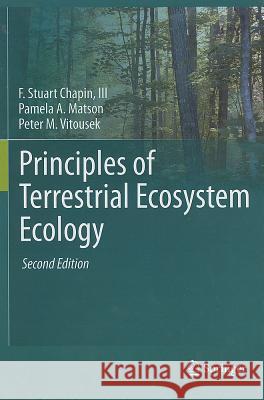Principles of Terrestrial Ecosystem Ecology » książka
Principles of Terrestrial Ecosystem Ecology
ISBN-13: 9781441995032 / Angielski / Twarda / 2011 / 529 str.
Principles of Terrestrial Ecosystem Ecology
ISBN-13: 9781441995032 / Angielski / Twarda / 2011 / 529 str.
(netto: 611,96 VAT: 5%)
Najniższa cena z 30 dni: 616,85
ok. 16-18 dni roboczych.
Darmowa dostawa!
The ecosystem approach to ecology treats organisms and the physical elements of their environment as components of a single, integrated system. This comprehensive textbook outlines the central processes that characterize terrestrial ecosystems, tracing the flow of water, carbon, and nutrients from their abiotic origins to their cycles through plants, animals, and decomposer organisms. As human activity becomes an increasingly dominant factor in natural processes around the globe, landscape dynamics over time and space have become the focus of recent attention. This book synthesizes current advances in ecology with established theory to offer a complete survey of ecosystem pattern and process in the terrestrial environment. Featuring review questions at the end of each chapter, suggestions for recommended reading, and a glossary of ecological terms, Principles of Terrestrial Ecosystem Ecology will be an important text suitable for use in all courses on ecosystem ecology. Resource managers, land use managers, and researchers will also welcome its thorough presentation of ecosystem essentials. About the Authors F. Stuart Chapin, III is Professor of Ecology at the Institute for Arctic Biology, University of Alaska at Fairbanks. Pamela Matson is Professor in the Department of Geological and Environmental Sciences and the Institute of International Studies, Stanford University; Director of the Earth Systems Degree Program and co-director of the Center for Environmental Science and Policy, Stanford University; and currently serves as president of the Ecological Society of America. Harold A. Mooney is Professor of Environmental Biology at Stanford University.
The ecosystem approach to ecology treats organisms and the physical elements of their environment as components of a single, integrated system. This comprehensive textbook outlines the central processes that characterize terrestrial ecosystems, tracing the flow of water, carbon, and nutrients from their abiotic origins to their cycles through plants, animals, and decomposer organisms. As human activity becomes an increasingly dominant factor in natural processes around the globe, landscape dynamics over time and space have become the focus of recent attention. This book synthesizes current advances in ecology with established theory to offer a complete survey of ecosystem pattern and process in the terrestrial environment. §Featuring review questions at the end of each chapter, suggestions for recommended reading, and a glossary of ecological terms, Principles of Terrestrial Ecosystem Ecology will be an important text suitable for use in all courses on ecosystem ecology. Resource managers, land use managers, and researchers will also welcome its thorough presentation of ecosystem essentials. §About the Authors§F. Stuart Chapin, III is Professor of Ecology at the Institute for Arctic Biology, University of Alaska at Fairbanks. Pamela Matson is Professor in the Department of Geological and Environmental Sciences and the Institute of International Studies, Stanford University; Director of the Earth Systems Degree Program and co-director of the Center for Environmental Science and Policy, Stanford University; and currently serves as president of the Ecological Society of America. Harold A. Mooney is Professor of Environmental Biology at Stanford University.











